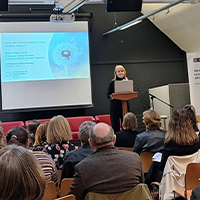By Matthew Smith
A paper authored by University of North Carolina at Chapel Hill School of Social Work researchers is being recognized as one of the best of the year.
“Building trusting relationships to support implementation: A proposed theoretical model,” published in the September 2022 edition of Frontiers in Health Services, was honored by the journal as one of its Paper of the Year Award 2023 winners.

The study, led by School Director of Implementation Practice and Professor of the Practice Allison Metz, examines the role of trust in relationship-building, particularly when it comes to the relationship between implementation support practitioners and implementation partners. Research Associate Todd Jensen, Implementation Associate Amanda Farley, doctoral graduate Melissa L. Villodas, and former Implementation Specialist Leah H. Bartley also co-authored the paper.
“We are so thrilled by this recognition and grateful to the William T. Grant Foundation for its support,” Metz said. “We hope this helps highlight how paying attention to implementation practice can strengthen implementation science.”
Implementation science examines the science behind adoption and integration of evidence-based practices, policies and interventions in health care services.
Metz, Jensen and their team examined the role trust plays in implementation adoption and how trust between practitioners and partners leads to an increase in motivation, capability and opportunity for sustained implementation.
We spoke with Metz at the School’s Collaborative for Implementation Practice to learn more about the paper.
Many of us talk about trust being a vital component of our relationships, but research into trust building with implementation partners has been lacking. Why did you and your team decide to approach this as a research topic?
There is a growing disconnect between implementation science and practice — sometimes referred to as the “ironic gap” or “paradoxical gap.” The purpose of implementation science is to close the research-to-practice gap, but implementation science doesn’t focus enough on this finding: that what practitioners and community members say matters the most in whether or not implementation efforts will be successful.
Implementation moves at the speed of trust. Yet, we have limited theoretical and practical understanding of how to build trust among implementation partners. We decided it was important to change that, and to study issues that felt incredibly relevant to the communities we work in.
The paper poses a theory of change that shares how implementation support practitioners (ISPs) can build trust with partners. Can you share some of the ways you found that trust can be built?
We have found that trust can be developed by providing opportunities to grow empathy for different perspectives among various implementation partners. Understanding the perspective of others engaged in or affected by implementation efforts and, specifically, understanding the emotions that undergird those perspectives can facilitate trust building. We have also found that trust can be built by co-creating benchmarks for early signs of progress and then celebrating those milestones together.
Can you discuss the difference between relational and technical strategies for building trust? Does your theory rely on using just one strategy, both strategies, or does it depend on the partner you’re working with?
Relational strategies focus on building trust among partners by strengthening the quality, mutuality and reciprocity of relationships, while technical strategies focus on building trust by demonstrating competency, credibility and responsiveness to implementation partners. We believe that both strategies are needed, but we don’t yet know if there are specific packages or sequencing of trust-building strategies that work best under certain conditions. We have just submitted a paper for peer review featuring our research that demonstrates both technical and relational strategies can improve trust among implementation partners.
How did you find that trusting relationships changed behaviors for partners? What does this mean for ISPs and their effectiveness in the future when using the trust strategies outlined in your theory?
In a recent study funded by the William T. Grant Foundation, we found that the explicit use of trust-building strategies can improve trusting relationships among implementation partners in a public child welfare system. Partners demonstrated increased empathy for different roles, an increased sense of psychological safety among members of the implementation team, and an increased focus on ongoing learning and data use. Consequently, implementation partners reported increased motivation, commitment and capability for supporting the change effort.
What are some of the past strategies ISPs have used with partners? How do you think those strategies can be enhanced by implementing your theory’s strategies?
Implementation support practitioners have always named relationships as critical to their work. In many ways trusting relationships seemed to be a moderator for the effectiveness of any other implementation strategy used by ISPs, such as data use, readiness assessment, fidelity assessments, or team development. This work highlights the importance of trusting relationships, but also demonstrates that building trust can be an implementation strategy on its own.
How do you hope this theory is used by ISPs in the future? How do you see it improving the field of implementation science?
We hope this theory helps to close the emerging gap between implementation science and practice by demonstrating that implementation scientists can rigorously study constructs — such as trust — deemed relevant by practitioners.
Read the team’s full paper online.
Related stories

School of Social Work’s Metz takes stage in Ireland
The School of Social Work’s Allison Metz took center stage last month more than 3,000 miles from Chapel Hill, delivering a keynote address in Dublin, Ireland.

Collaborative for Implementation Practice launches website
CIP is a multidisciplinary, international community of professionals who support implementation and evidence use.

